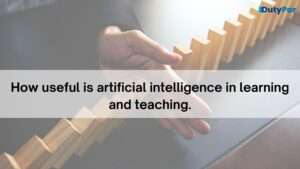 The genius of artificial intelligence is one of the biggest technological advancements that has astounded humanity (AI). Artificial intelligence (AI) is a novel software technology that mimics human intellect through machine learning. Because they prefer to think like people, the programs created by artificial intelligence take actual human-interested activities. The incorporation of AI has permeated every aspect of our everyday lives thanks to its supreme skill and capacity for human-like behavior. From snapping images to automatic parking guidance in cars, commercial data analysis, and medical innovation, the presence of AI has become inescapable.
The genius of artificial intelligence is one of the biggest technological advancements that has astounded humanity (AI). Artificial intelligence (AI) is a novel software technology that mimics human intellect through machine learning. Because they prefer to think like people, the programs created by artificial intelligence take actual human-interested activities. The incorporation of AI has permeated every aspect of our everyday lives thanks to its supreme skill and capacity for human-like behavior. From snapping images to automatic parking guidance in cars, commercial data analysis, and medical innovation, the presence of AI has become inescapable.
Artificial intelligence (AI) has the potential to revolutionize the way we learn and teach. Here are a few ways in which AI is being used in education:
Personalized Learning: AI-powered learning systems can analyze a student’s performance, learning style, and progress to create personalized learning experiences. This can help to address the individual needs of each student, which is particularly beneficial for students who struggle with traditional teaching methods.
Intelligent Tutoring Systems: AI-powered tutoring systems can provide students with real-time feedback, guidance, and support. These systems can also adapt to a student’s progress, adjusting the difficulty level of the content as needed.
Automated Grading: AI can be used to grade student assignments and assessments, providing teachers with more time to focus on instruction and providing students with more timely feedback.
Adaptive Curriculum: AI can be used to create adaptive curriculum, which adjusts the content and pace of instruction based on a student’s performance. This can help to ensure that students are challenged at the appropriate level and that they are not held back or left behind.
Intelligent Content Generation: AI can be used to create educational content, such as personalized lesson plans and interactive games. This can help to make learning more engaging and can also reduce the workload for teachers.
Predictive Analytics: AI can be used to predict student performance, identify at-risk students, and inform instructional decisions. This can help to ensure that students receive the support and resources they need to succeed.
Language Learning: AI-powered language learning systems can provide students with personalized instruction, real-time feedback, and interactive activities. These systems can also adapt to a student’s progress, adjusting the difficulty level of the content as needed.
However, it is important to note that AI is not a panacea for education. Its effectiveness depends on the quality of the data and algorithms used, as well as on the ability of educators to use AI effectively. Additionally, there are also ethical concerns about the use of AI in education, such as bias and privacy. Therefore, it is important to approach the use of AI in education with a critical and thoughtful mindset.
Conclusion
Parents who are always worried about their children’s social lives would profit from AI. They may now keep a closer eye on their child’s internet activity than ever before thanks to AI technology. Schools employ software that analyzes data points, such as the degree to which different pupils learn content, and then assigns students to groups depending on their individual needs. With AI, students will be able to access instructors and classes around-the-clock from any location. AI may be used in education to help students achieve their goals by giving them individualized feedback on their assignments, tests, and other assignments based on AI algorithms. Because it can do trivial jobs, such as organizing emails or finding things, artificial intelligence has the potential to make everyone’s life simpler through automation.